Emergency! - Heat Stroke
Your friend looks flushed and she feels dizzy. Is she having a heat stroke? Learn to recognise the signs of this serious heat injury that can sometimes turn fatal.
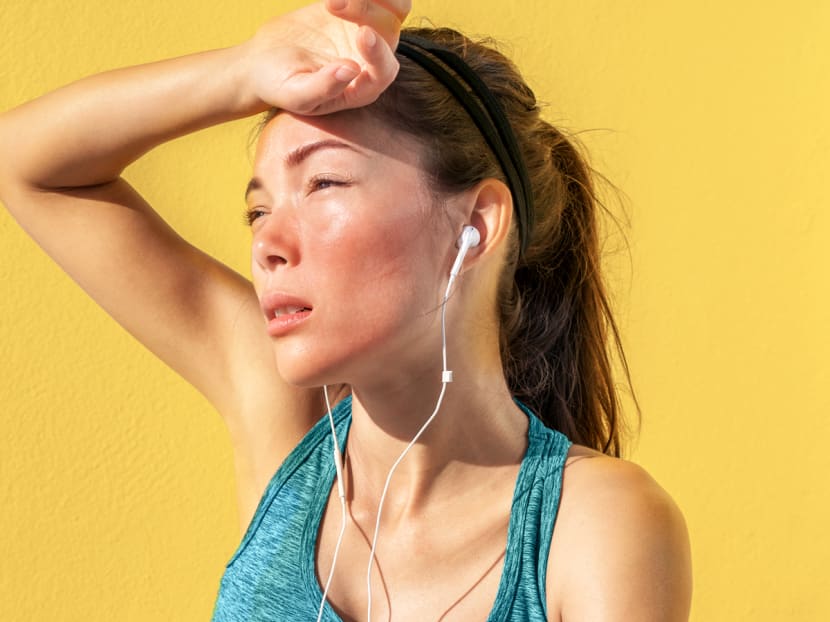




Text by Lyn Chan
PICTURE THIS
The sun is bright, but it is not much hotter than any other day in Singapore. Strangely, she is not perspiring in the slightest. What is the first thing you should do if your friend turns to you and says, swaying slightly, "I think I'm having heat stroke"?
ACarry on walking. Not sweating, what heat stroke? What she needs is a cold drink!
BSit down anywhere, even if there is no shade. She is probably just tired and uncomfortable from the oppressive tropical heat.
CCall 995 and splash some cold water on her. It could be serious!
What should you do? Read on.
In sunny Singapore, it is common to hear passing remarks like, "The weather is so hot and humid, it is giving me a heat stroke," by those who just want to convey their discomfort and are not actually suffering from the serious heat injury. It may come as a surprise that each year, there are up to 150 cases of heat stroke, some of which are fatal!
Just ask Ms Joyce Foo, who suffered from heat stroke, not once but twice.
The first time, she was cycling downhill with buddies when she shouted out that she was getting off her bike. Dizziness and a headache had overcome her. She immediately squatted down for stability, her face red like a cooked lobster. No perspiration was visible.
Her Singaporean friends were bewildered, uncertain about what to do. However, her New Zealander friend who was visiting recognised the signs of heat stroke. He helped her walk down to level ground and seated her under shade before dashing off to get some cold water to cool her down.
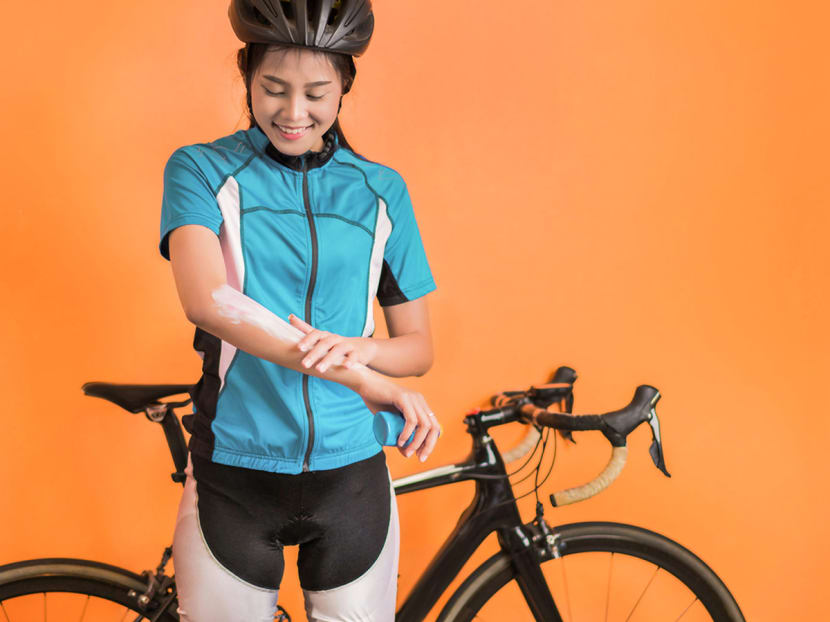
Mr Alvin Chen, an avid athlete, has his own method of protecting himself against heat stroke. He admits, however, that he is not sure if what he does is correct.
As a former school runner in Singapore, he used to take to the track almost every week for thrice-weekly practices; more frequently whenever competition dates drew near. Singapore's heat and humidity were never deterrents. After training sessions, he would stand under a cold shower for 15 minutes to cool himself down. He had read about athletes collapsing and dying from exertional heat stroke, and did not want to be a victim. He has not suffered from one so far and does not know if this is because he was lucky or he did the right thing.
Find out how you can stave off heat stroke
A heat stroke is a form of hyperthermia and occurs when the body's temperature rises quickly from prolonged exposure to or physical exertion in high temperatures.
In any heat, be it indoors or outdoors, perspiration is the most effective natural coolant. It collects on the skin, evaporating and drawing heat from the body. But when heat and humidity are high, or when too much clothing is worn, the sweat simply drips off and the skin does not stand a chance at being cooled.
The biggest issue in heat stroke, then, is not the external temperature, but the internal one.
Signs include confusion, hallucinations, weakness, dizziness and nausea. Skin usually starts off cold and clammy — heat exhaustion, an early sign of trouble — and becomes hot, flushed and dry as a heat stroke takes over. The reasons as to why patients do not sweat during a heat- stroke is quite poorly understood and multifactorial; reasons include being so dehydrated that no sweat production is possible, being on certain medications, and genetic make-up. The inability to sweat is what causes the temperature to rise beyond 40 degrees Celsius.
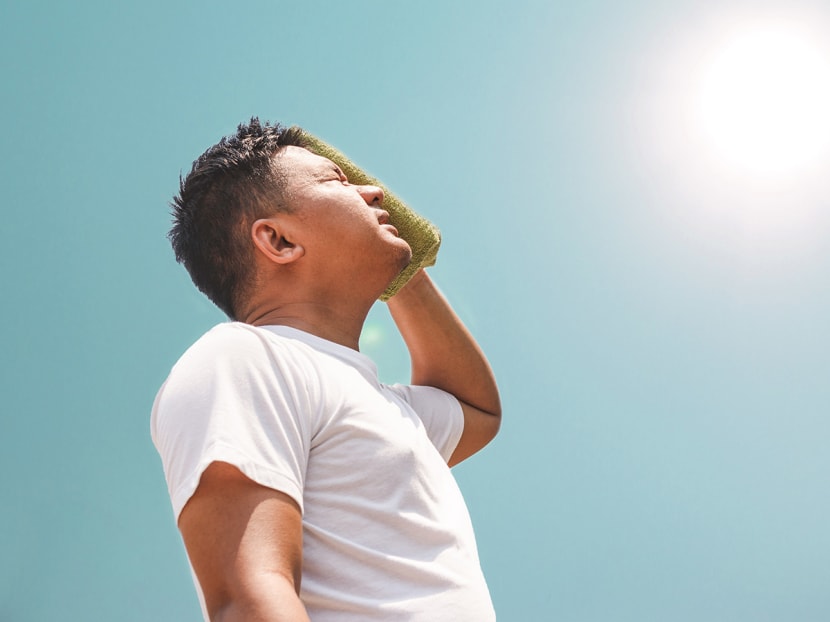
During workouts, ease off if you feel at all off. If you are running, slow to a jog. If you are jogging, walk. Seek out shade if you are outdoors; better yet, make your way to an air- conditioned space. Sit or lie down, and initiate rapid cooling, preferably with an ice bath. Sip, not gulp, water.
Many people perceive that heat is merely uncomfortable and do not recognise the dire risks it presents. Severe heat stroke, if not treated, can result in irreversible damage to the brain, the heart or the kidneys, or even death. If someone with heat stroke stops breathing, emergency medical help is critical — call 995 and perform cardiopulmonary resuscitation, more commonly known as CPR.
While waiting for the paramedics, continue wiping down with a damp cloth using cold water or ice cubes. Important areas to target: the neck and the underarms.
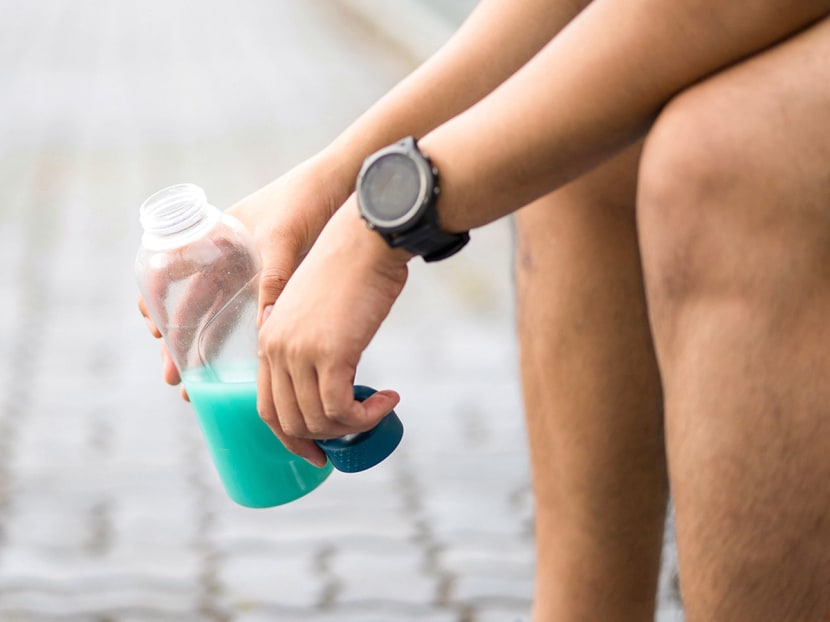
Instinct might spur you to give a heat-stroke victim paracetamol or aspirin in a bid to bring down his body temperature. But that pill may make matters worse, as a high temperature of 40 degrees Celsius and above from heat stroke is not the same as a fever-induced temperature.
The next time your friend turns to you and moans, "Help, I think I'm having a heat stroke," you know what to do.
Medical consultation provided by: Dr Joy Quah, Associate Consultant, Department of Emergency Medicine, Singapore General Hospital
Stave off heat stroke!Heat and humidity, both of which Singapore is known for, are a killer combination. Heat stroke is 100 per cent preventable. Learn how to protect yourself and stay cool, literally!
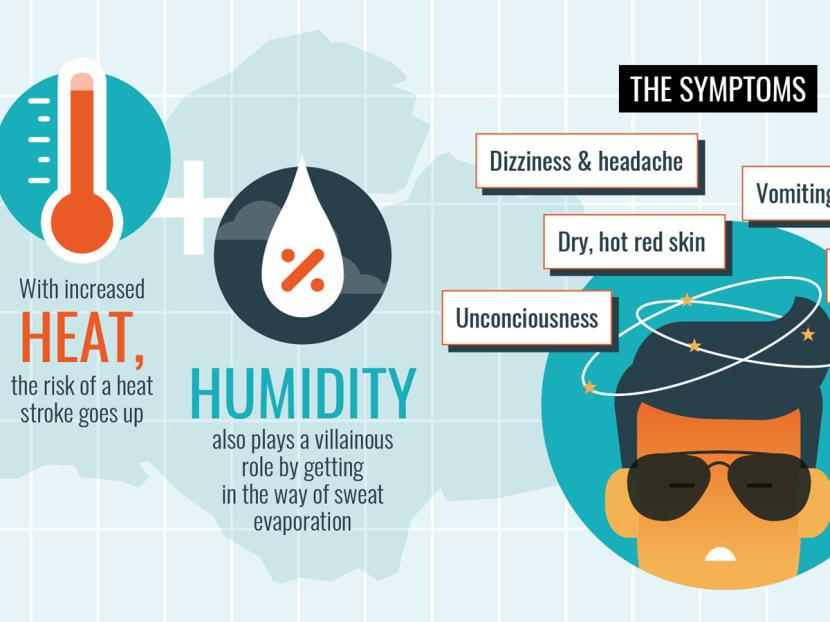
Your body's ability to cool down in hot weather depends on your sweat evaporating at a rate sufficient to lower your body temperature. If your sweat cannot evaporate sufficiently to cool you down, or it is so humid that sweat cannot evaporate easily, your body could overheat, which can be fatal.
High heat + high humidity = heat stroke?YOU CAN PREVENT IT WITH THESE TIPS

This is the hottest period of the day and the possibility of heat stroke is high. Use an umbrella or wear a visor, and always have water on hand if you need to be outdoors. If you work outside, take breaks and stay hydrated.

Go for clothes that are cooling, light and not too tight. A quick way to cool the body is to dip a towel in cold water and press it on the neck, armpits and groin area.

Put aside caffeinated drinks and alcohol before exercising — they are diuretic and could leave you dehydrated. Avoid exercising when you feel unwell, as this can make you more likely to suffer from heat exhaustion.
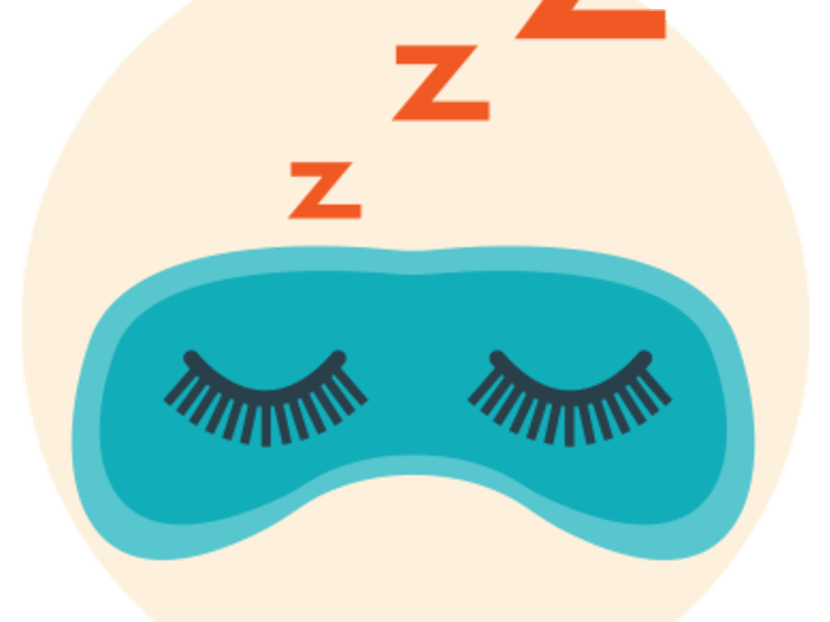
You need to be well- rested as metabolism in hot weather tends to be high. Fatigue is a common complaint. Ample sleep can relax the brain and body system, hence preventing heat stroke.
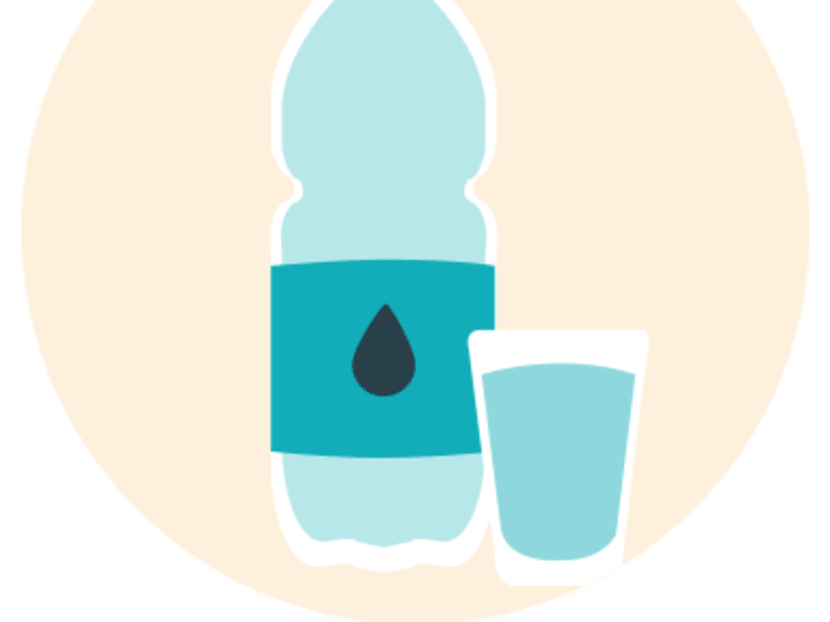
Don't wait for a parched throat before reaching for water. When you feel thirsty, your body is already screaming out for water. Keep to eight to 10 glasses per day, and more if you are exercising.
Glugging water before any exercise may not be best, as it does not help replace the salts lost through sweating. An imbalance of salts leads to cramps or weakness of the arms. Isotonic drinks may be better to cope with heat stroke, as it replenishes the electrolytes lost through sweating.
Sources: Singapore General Hospital
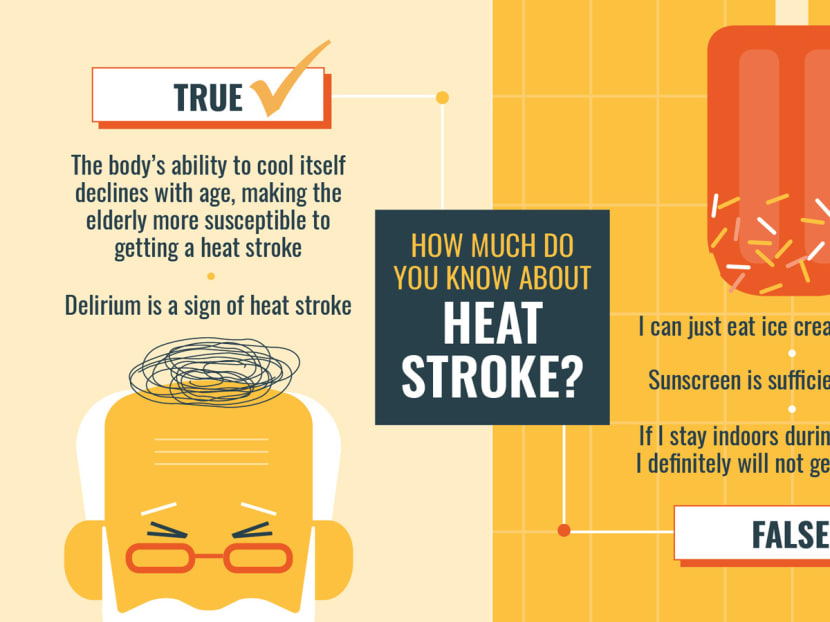




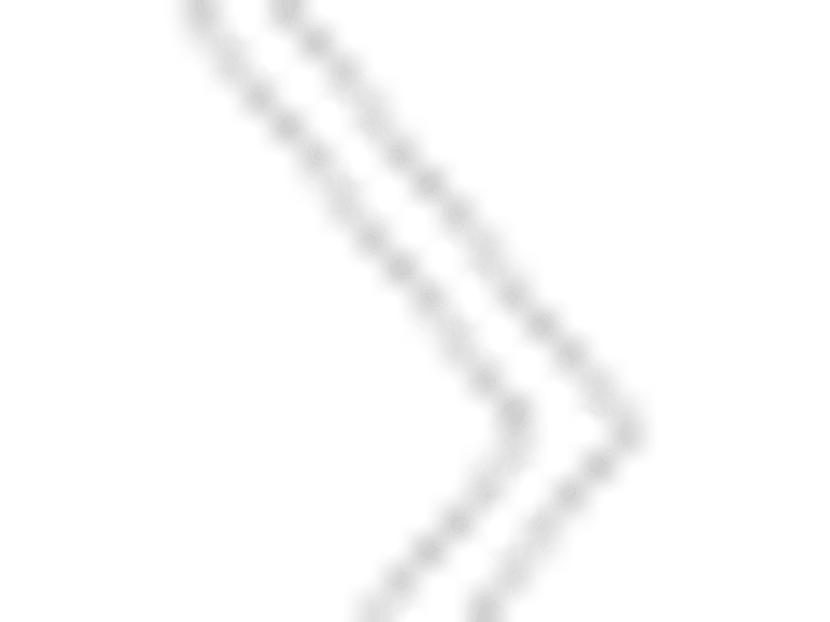
Emergency! — Bleeding Injuries








